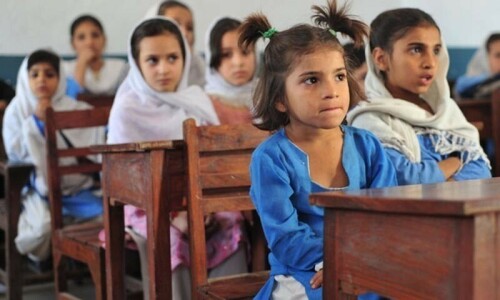ISLAMABAD: The Senate Standing Committee on Poverty Alleviation and Social Safety was on Tuesday informed that the National Socio-Economic Registry (NSER) Programme was facing challenges such as law and order situation in a few areas, logistic arrangements for hilly areas and harsh weather conditions.
The committee, chaired by Senator Dr Jehanzeb Jamaldini, at a meeting discussed the status of NSER and was briefed on Trust for Voluntary Organisation (TVO).
The meeting was attended by Senators Dr Asif Kirmani, retired Lt. Gen Abdul Qayyum, Mohammad Asad Ali Khan Junejo, Engr Rukhsana Zuberi,Samina Saeed, Mirza Mohammad Afridi and senior officers from the Ministry of Poverty Alleviation and Social Safety.
The committee was informed that NSER falls under the ambit of Benazir Income Support Programme (BISP) and was established to ensure objectivity in identifying beneficiaries and for transparency in implementing interventions and effective targeting of` BISP beneficiaries.
Lawmakers stress sustainability of beneficiaries through livelihood opportunities
The NSER was established as a result of a 2010-11 nationwide Poverty Score Card (PSC) survey. Complete information on the socioeconomic and welfare status of about 27 million households was collected under the survey. This data was then used to determine beneficiaries’ identification and eligibility for BISP’s ‘Unconditional Cash Transfer (UCT) Payments’.
This was done using a Proxy Means Test (PMT) targeting methodology. The data were further used to determine eligibility of beneficiaries for ‘Conditional Cash Transfer Program’, ‘Waseela-i-Taleem’ and other ‘poverty-exit’ initiatives by BISP.
Beyond BISP, more than 100 government and non-government organisations have utilised the data to target beneficiaries for their respective programmes. It has also provided support to cent percent women of 231 villages along the Line of Control (LoC).
The committee lauded the programme and asserted that measures must be taken by the ministry to ensure sustainability of beneficiaries by introducing livelihood opportunities.
Senator Rukhsana Zuberi stressed the need for non-duplication of efforts and optimum utilisation of resources such as data from the census department.
Discussing the role, functions, budget and performance of the Trust Voluntary Organisation, the committee was informed that primary focus sectors are primary education,primary healthcare, livelihood, environment, disaster management, water, sanitation and hygiene. Gender and environment and protection are cross-cutting themes in all of TVO interventions.
The organisation has presence in all the four provinces, through eight regional offices.
Published in Dawn, September 9th, 2020














































Dear visitor, the comments section is undergoing an overhaul and will return soon.